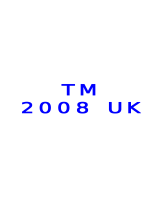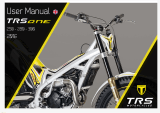
-5-
TABLE OF CONTENTS
Foreword.........................................................................................3
Important notice..............................................................................4
Table of contents ............................................................................5
General information ........................................................................6
Component locations......................................................................8
Side stand.....................................................................................10
Petrol ....................................................................10
Serial number and the qualification approval plate.......................11
Starting and stopping the engine .....................................12
Cold starting ............................................................13
Gear changes...........................................................13
Stopping the motorcycle...............................................14
Break-in .................................................................14
Maintenance chart .....................................................15
Battery...................................................................16
Cooling system .........................................................17
Spark plug.....................................................................................20
Air filter ..................................................................23
Accelerator cable.......................................................24
Clutch....................................................................25
Exhaust system ........................................................25
Chain guide .............................................................26
Tension adjustment ....................................................27
Handle bars.............................................................29
Brakes ...................................................................29
Steering .................................................................31
Steering lock............................................................32
Front forks...............................................................33
Rear suspension .......................................................36
Wheels ..................................................................38
Cleaning.................................................................39
Tighten bolts and nuts .................................................40
Tightening torque table ................................................41
Lubrication ..............................................................42
Engine oil................................................................43
Suspension adjustment................................................47
In competition...........................................................52
Storage ..................................................................53
Multi-function instructions ............................................53
Fault diagnosis .........................................................55
Electrical schemas .....................................................61
Guarantee manual .....................................................63























